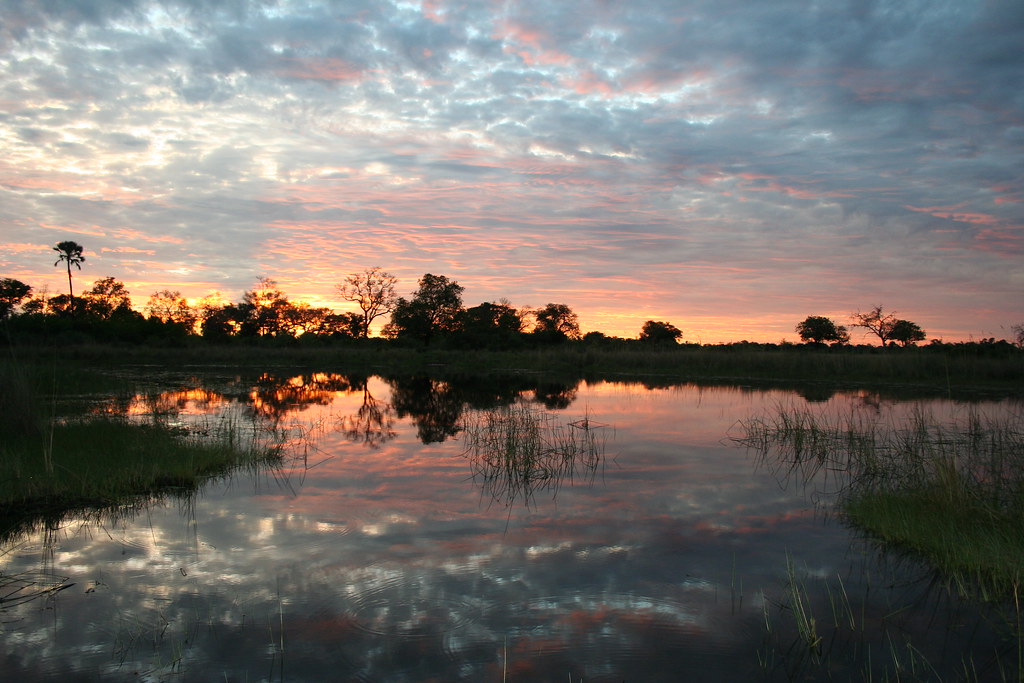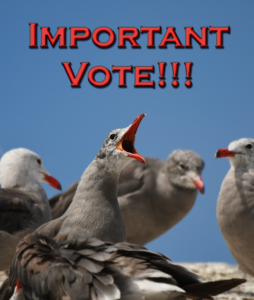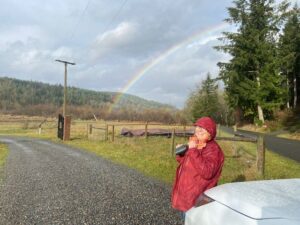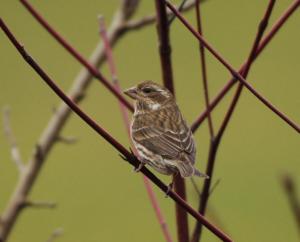By Hal Michael

Last November we spent a couple of weeks on safari in the Okavango Delta area of northern Botswana. The Okavango Delta is fed by one river whose origins are in forests of Angola. It then flows southward through a little arm of Namibia and then into Botswana where it spreads out into a delta with a network of streams, islands, swamps, and such. Because of the seasonality of the rainfall the river’s flow is seasonally very reduced. We were there during the time of low flows with many of the more southern channels and ponds being water-free. In past millennia the river actually reached the ocean but earthquakes, massive land movements, and a drying climate now result in a closed system.
Botswana has chosen to manage the Okavango Delta area for high-end ecotourism based on small, widely spaced camps. They limit the number of tourists, limit the number of camps and access to them, maximize the animal populations, and try to maintain the habitat to support the animals. There is little infrastructure in that the camps are fly-in, they operate on generators and solar power, and so on. Angola, on the other hand, is emphasizing development of the land for agriculture. They are apparently selling water rights and land to China for the culture of rice to feed China’s burgeoning population. This diversion of water will reduce flows to the delta and narrow the timeframe when water is delivered to delta which will make significant changes to the ecosystem and impact Botswana’s management of the area. Major changes will include a reduction in the capacity of the land to support animals through lack of water, changes in vegetation, and an exacerbation of human/wildlife conflicts.
The big question here is “Whose water is it”? Should Angola forego agriculture, and its economic benefits to them, so that Botswana can meet their economic desires? Should Botswana forego not only its tourist industry but also its native ecosystems? To put the question closer to home, what would be our response if Canada dammed and diverted the Skagit and Yukon so that all the water collected upstream of the border was retained in Canada, maybe even for sale to the US, or if the US dammed and then used all of the Colorado and Rio Grande internally with none available to Mexico? We already see this conflict in the Colorado River watershed where there are agreements for more water to be diverted than exists in the river. And the Colorado is allocated without making any provision for natural resources to use the water. How do we split shared resources.
What should upstream residents do with the water that flows through their land but then flows to another country? How should the world’s resources be divided, especially since we are limited to one earth. Why is it wrong for, say, Angola to divert water for its use? Are Botswana’s needs superior just because they focus on supporting sustainable wildlife? Why?
Over my lifetime, now over 70 circuits of the sun, there have been some significant recoveries of rare wildlife in North America. During that time, Bald Eagle, Peregrine, Whooping Crane, California Condor, Wood Duck, Grey Whale, Elephant Seal, Sea Otter, Alligator, Trumpeter Swan, California Sea Lion, Harbor Seal, and Grey Wolf have all increased to the point where some are now hunted, some have reached what appears to be pre-exploitation populations, and the rest are common enough to be rather easily and comfortably observed.
Although much of the recovery can attributed to actions taken under the Endangered Species Act (ESA), recovery was occurring for many of these pre-ESA. It should be noted that these species can be referred to as “Charismatic Megafauna”, which was probably what many of the early ESA supporters were thinking of. Further, much of the recovery of the species listed above (except wolves), was accomplished without a significant change to human activities. Basically, stop killing them, stop using DDT, and utilize some captive breeding/release strategies. But, as time passed, these species have come into conflict with other societal desires.
Depending on which of the species I listed above there are now conflicts for a variety of reasons that include use of lead projectiles, their preferred natural prey, preying on domestic animals, or the need for more land. Other conflicts have arisen such as with logging and Spotted Owl and Marbled Murrelet. While these are certainly causing conflicts, I would like to open another can of worms whose answer, I believe, should guide all species recovery activities.
Management of natural resources is not made based just on the intrinsic value of that resource. There is a myriad of factors that are considered, including science, law, and political power. Despite popular belief, there are no win-win solutions. For example, the amount of water needed by a terrestrial ecosystem is all the water that falls onto it. Any diversion changes the ability of the stream to produce life. The same is true for levees, buffer strips, and so on. But humans are part of the ecosystem and have “rights” too.
The American model of natural resource management is actually a continuum from reasonably absolute protection to total utilization depending in the suite of involved interests and stakeholders. In reality, there is little or no “total protection” because we allow people in to hike, to recreate in any place money can access. There are some people who are advocating for leaving large tracts of land essentially locked up with no human presence allowed. The question becomes what right do we, the “Royal We”, have to tell someone that they cannot utilize a resource?
As an example, most analyses of Pacific Grey Whale populations suggest that the population is at or above the historic levels. The recent starvation events suggest that the whale’s population is above the capacity of the environment to support them. Should people be allowed to harvest some, provided that they are fully utilized? The same sort of conflict is occurring between predatory animals like pinnipeds and birds, the salmon they eat, and the same salmon that Killer Whales and humans wish to eat. Whose salmon are they? More importantly, why do they belong to someone?
Further, why is any one use more appropriate than another? The same question can be asked about any of the resources mentioned; why is one use more appropriate than another? I don’t have the answer but do believe that we need a much more inclusive discussion as to how we deal with divergent uses of common resources. Ultimately, we will have to come to grips with the fact that there is a direct relationship between the number of people in an ecosystem and the “naturalness” of that ecosystem. The decision as to how we, that “Royal We” again, decide just how we will share the world not only with each other but with whatever natural resources are left will require fully inclusive negotiations to decide whose water it is.







